On January 9, Xu Qin, Secretary of the CPC Heilongjiang Provincial Committee and Director of the Standing Committee of Heilongjiang People’s Congress, and Liang Huiling, Deputy Secretary of the CPC Heilongjiang Provincial Committee and Governor of Heilongjiang province, met with the university presidents attending the “Annual Presidents Meeting on Building World-Class Universities and Annual Presidents Forum.” Chen Jie, Secretary of the CPC Harbin Institute of Technology, and Han Jiecai, President of Harbin Institute of Technology, also participated in the meeting.
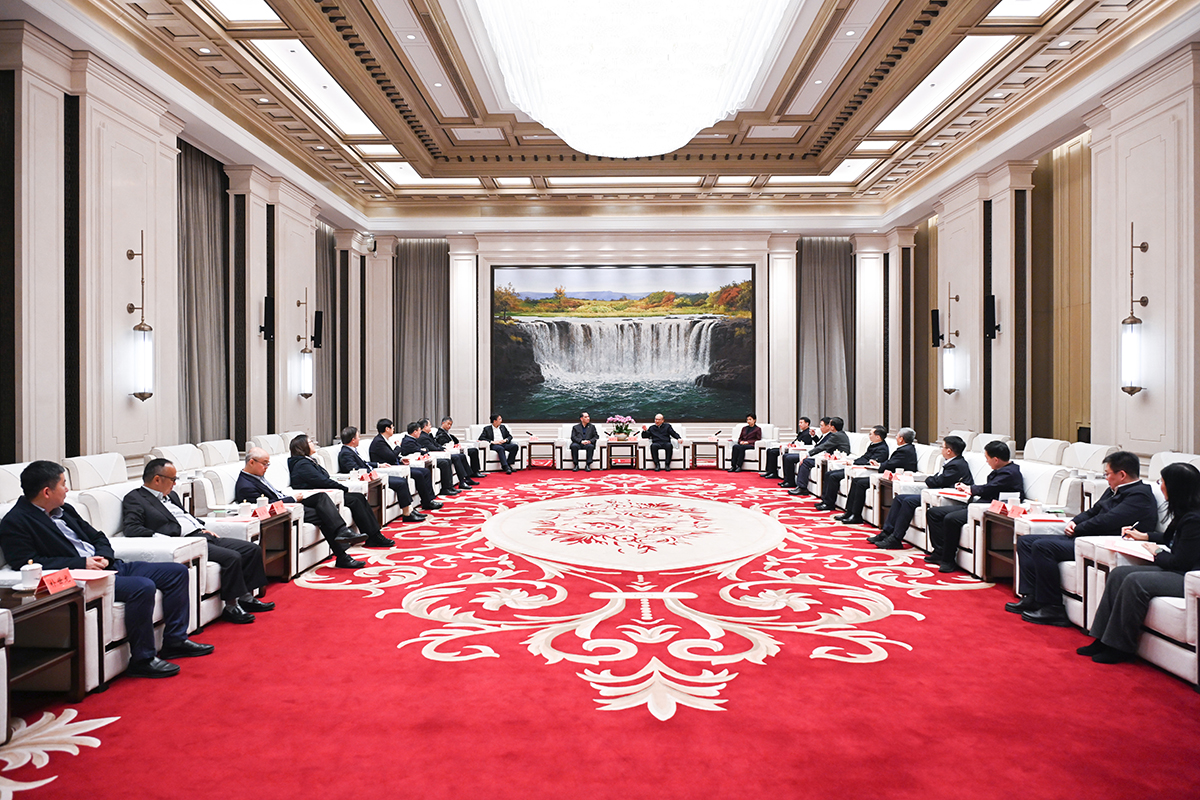 Xu Qin and Liang Huiling met with the university presidents.
Xu Qin and Liang Huiling met with the university presidents.
On January 10, the “Annual Presidents Meeting on Building World-Class Universities and Annual Presidents Forum” was held at Harbin Institute of Technology. Presidents from 13 prestigious universities, including Peking University, Tsinghua University, Harbin Institute of Technology, Fudan University, Shanghai Jiao Tong University, Nanjing University, Zhejiang University, University of Science and Technology of China, Xi’an Jiaotong University, University of Hong Kong, Chinese University of Hong Kong, Hong Kong University of Science and Technology, and University of Macau, gathered in the “Ice City” of Harbin to discuss topics including “the Mission and Responsibilities of World-Class Universities in Building a Strong Education Nation,” “the Practical Path of World-Class Universities in Promoting the Integrated Development of Education, Science and Technology, and Talent,” and “the Role and Value Contribution of World-Class Universities in Forging New Quality Productive Forces.”
The 13 universities jointly issued the “Harbin Declaration of the Association of University Presidents of China.”
Zhang Yunming, Vice Minister of the Ministry of Industry and Information Technology; Zhang Qixiang, Vice Governor of Heilongjiang Province; Wang Hesheng, Deputy Secretary of the CPC Harbin Municipal Committee and Mayor of Harbin; and Luan Zongtao, Deputy Director of the Department of Academic Degrees and Graduate Education of the Ministry of Education and Deputy Director of the Office of the State Council Degree Committee, attended the opening ceremony and delivered speeches. Han Jiecai, President of Harbin Institute of Technology, delivered the welcome address. Sun Xue, Executive Vice President of Harbin Institute of Technology, hosted the opening ceremony.
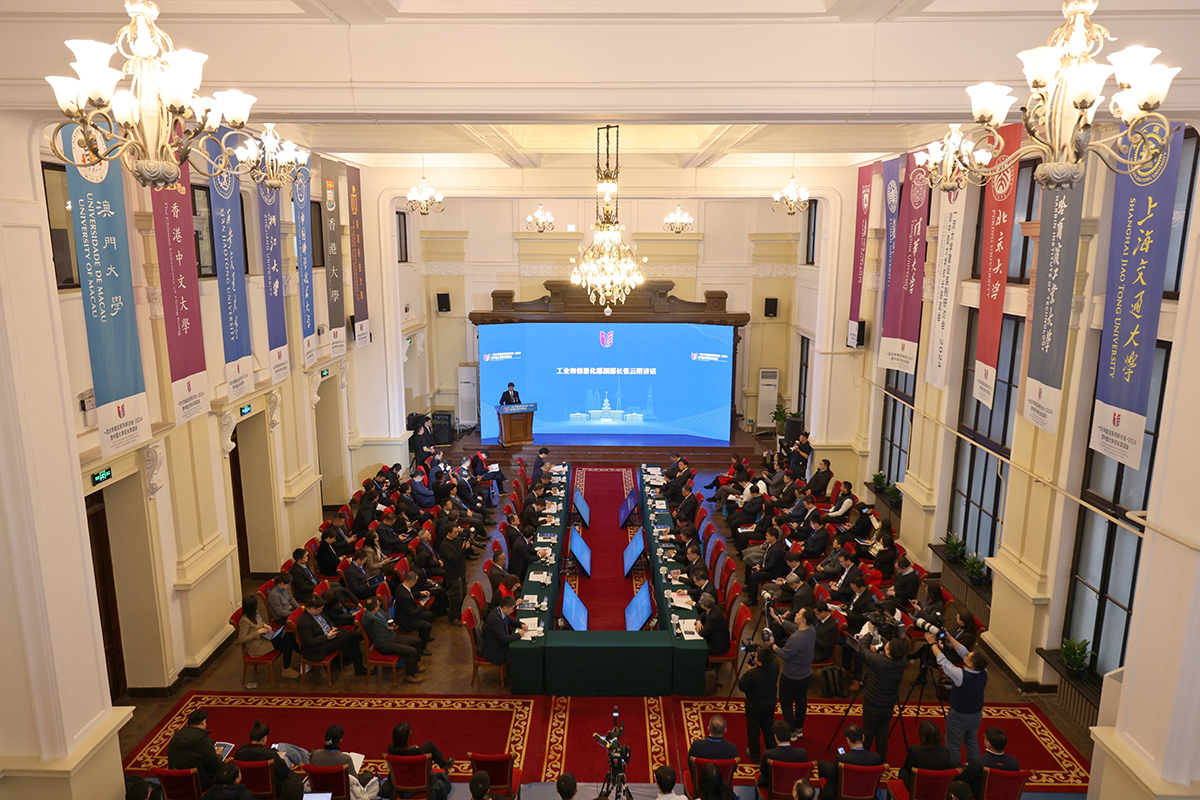 Annual Presidents Meeting on Building World-Class Universities and Annual Presidents Forum.
Annual Presidents Meeting on Building World-Class Universities and Annual Presidents Forum.
Zhang Yunming pointed out in his speech that, to build a strong country and move toward national rejuvenation on all fronts through Chinese path to modernization, achieving new industrialization is a key task. The deepening development of a new round of technological revolution and industrial transformation has made education increasingly critical in enhancing the nation’s core competitiveness. The Annual Presidents Meeting on Building World-Class Universities, held at Harbin Institute of Technology, is of great significance in advancing the integrated development of education, science and technology, and talent, promoting the deep integration of technological and industrial innovations, and supporting the development of new quality productive forces. He hopes that universities will focus on demand-driven approaches to build new models for independent talent cultivation, prioritize innovation to foster new momentum for the development of new quality productive forces, drive reforms to improve new mechanisms for education, science and technology, and talent, and strengthen collaborative cooperation to shoulder new responsibilities in Chinese path to modernization. He also hopes that the Annual Presidents Meeting on Building World-Class Universities and the Association of University Presidents of China will continue to play an important role as platforms, generating high-level outcomes. The Ministry of Industry and Information Technology will coordinate industry resources, support the“Double First-Class”Initiative in higher education, and promote the strategic leadership role in endeavors to build China into a strong country.
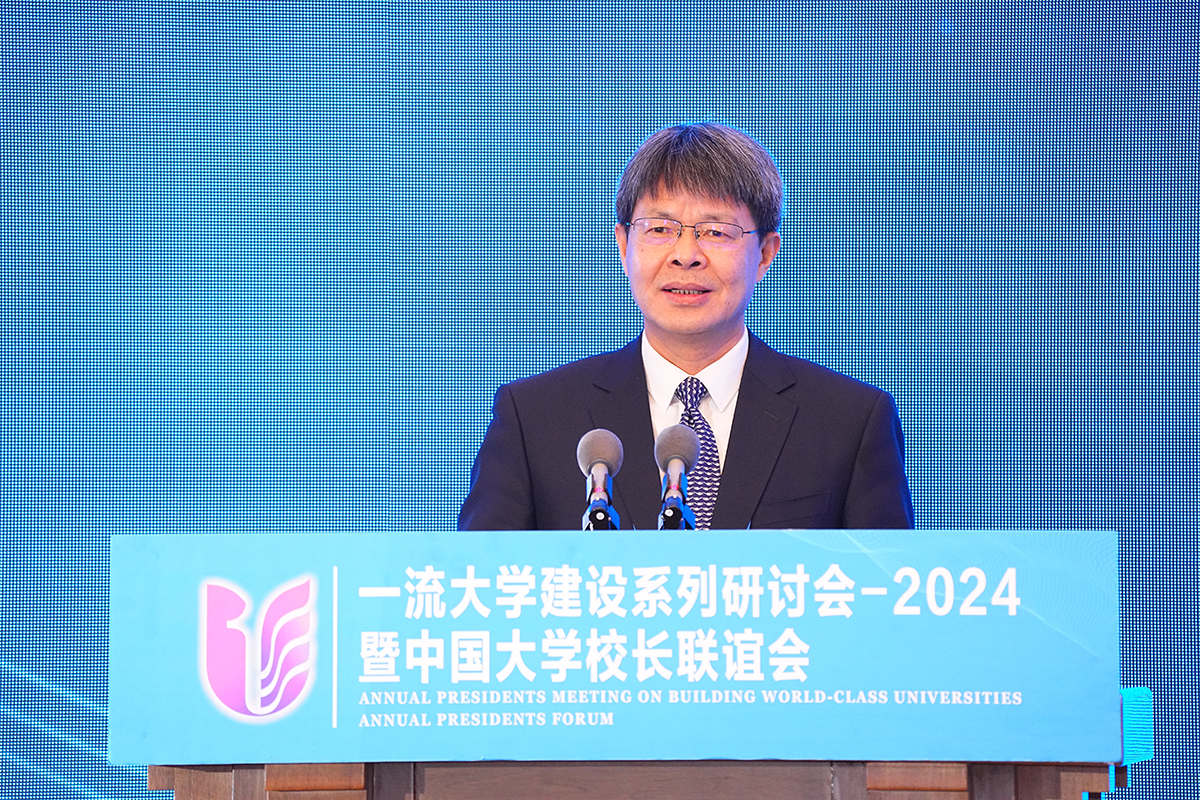 Zhang Yunming is delivering the speech.
Zhang Yunming is delivering the speech.
Zhang Qixiang emphasized that the CPC Heilongjiang Provincial Committee and the provincial government have resolutely implemented the important speeches and instructions of General Secretary Xi Jinping and accurately identified their strategic positioning in the national development framework. The province is focusing on the layout of new quality productive forces, making solid efforts to integrate education, science and technology, and talent development, and striving to contribute to the Chinese path to modernization and to write a new chapter for Heilongjiang. The Annual Presidents Meeting on Building World-Class Universities has become a significant event in the field of higher education, reflecting the active role of China’s higher education community in serving national strategic needs and providing new ideas and directions for the reform and development of higher education. He hopes to make comprehensive efforts in strengthening exchanges and cooperation with universities, providing all-round services and support for the development of research teams and innovative enterprises in Heilongjiang; to focus on building innovation platforms and collaboratively develop new quality productive forces; and to make continuous efforts to attract and cultivate outstanding talent, making Heilongjiang a desired destination, a preferred location, and a place for growth for talents.
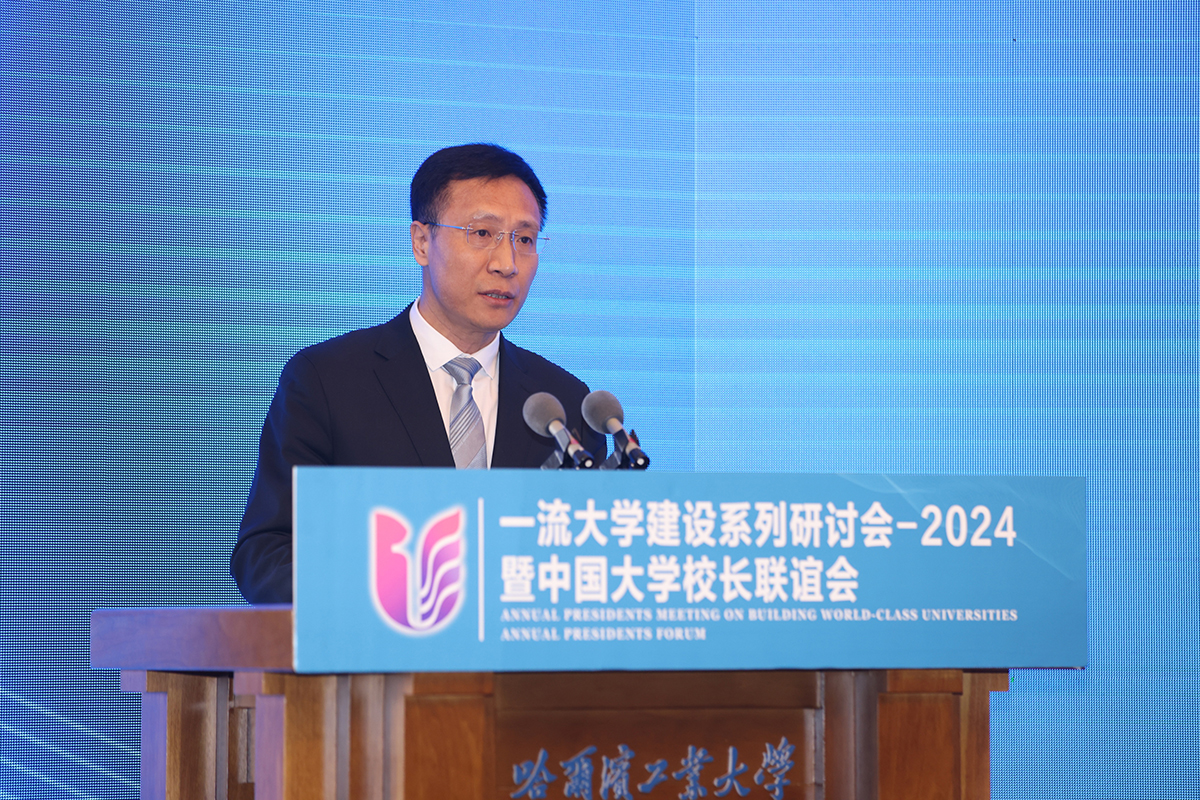 Zhang Qixiang is delivering the speech.
Zhang Qixiang is delivering the speech.
Wang Hesheng pointed out that the C9 League universities have always been at the forefront of building world-class universities and serve as a strategic force in building a strong education nation and an innovation-driven country. The Annual Presidents Meeting on Building World-Class Universities fully demonstrates the forward-thinking strategies and practical explorations of the C9 League universities, along with world-class universities in Hong Kong and Macau, in shouldering the mission of the times and serving high-quality development. During the meeting, Harbin City constructed an iconic ice sculpture park at the Ice and Snow World as a symbol of world-class universities, promoting the integration of university culture and ice and snow culture, and “illuminating” the Chinese higher education brand. He expressed hope that this meeting would serve as an opportunity to further expand city-university exchanges and cooperation, combining Harbin’s resources, industries, and geographical advantages with the needs of universities in research, innovation and talent cultivation. Work together to contribute to the comprehensive and all-round revitalization of Heilongjiang and the construction of a strong education nation in the new era.
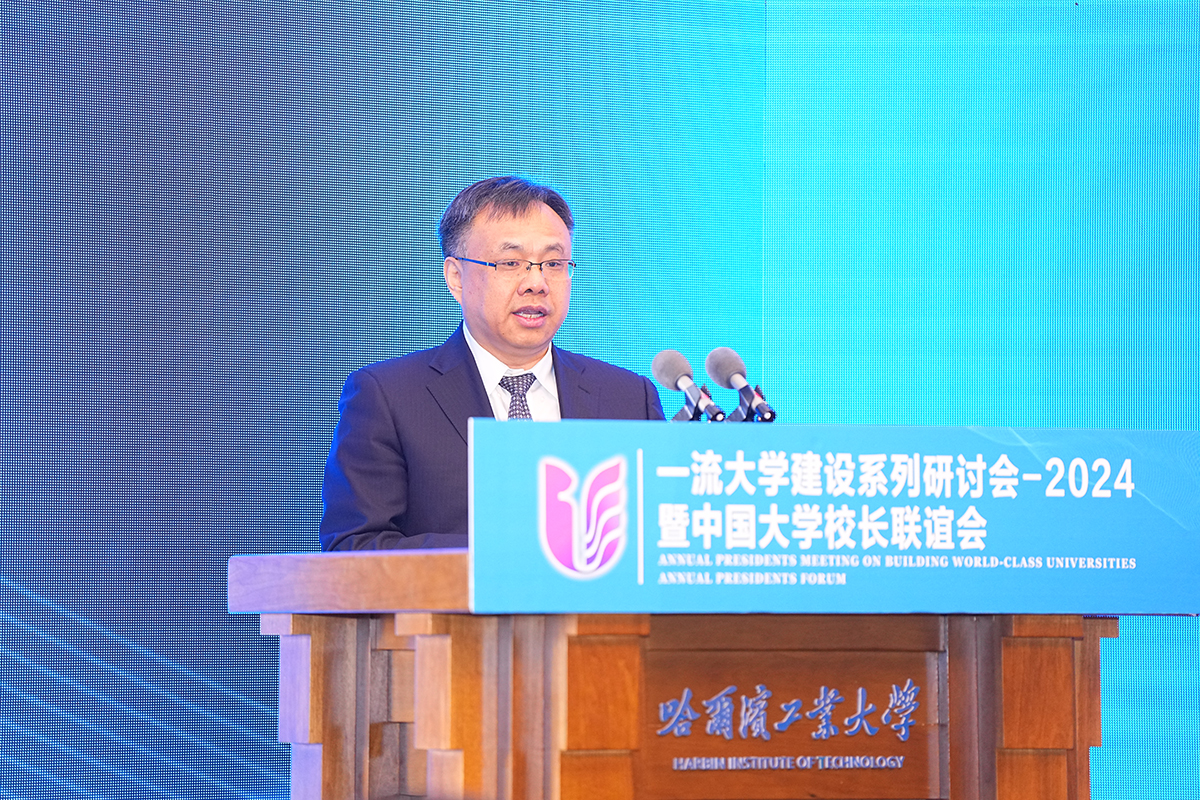 Wang Hesheng is delivering the speech.
Wang Hesheng is delivering the speech.
Luan Zongtao pointed out that since entering the new era, the “Double First-Class” Initiative has become a leading and emblematic project for China’s higher education. Since the first Annual Presidents Meeting on Building World-Class Universities was held in 2003, the meeting has provided a platform for world-class universities to discuss development, exchange experiences, and deliberate on issues, playing a significant role in advancing the construction of world-class universities in China. He expressed hope that universities would base their efforts on the practice of Chinese path to modernization, systematically grasp the important discourse of General Secretary Xi Jinping on education, deeply implement the spirit of the National Education Conference, and with the autonomous scientific determination of the “Double First-Class” standards as a guide, plan and think about new paths for the construction of world-class universities with Chinese characteristics through discussions and exchanges. By offering global solutions through Chinese wisdom, we aim to make new contributions through Chinese higher education to developing a new form of human advancement.
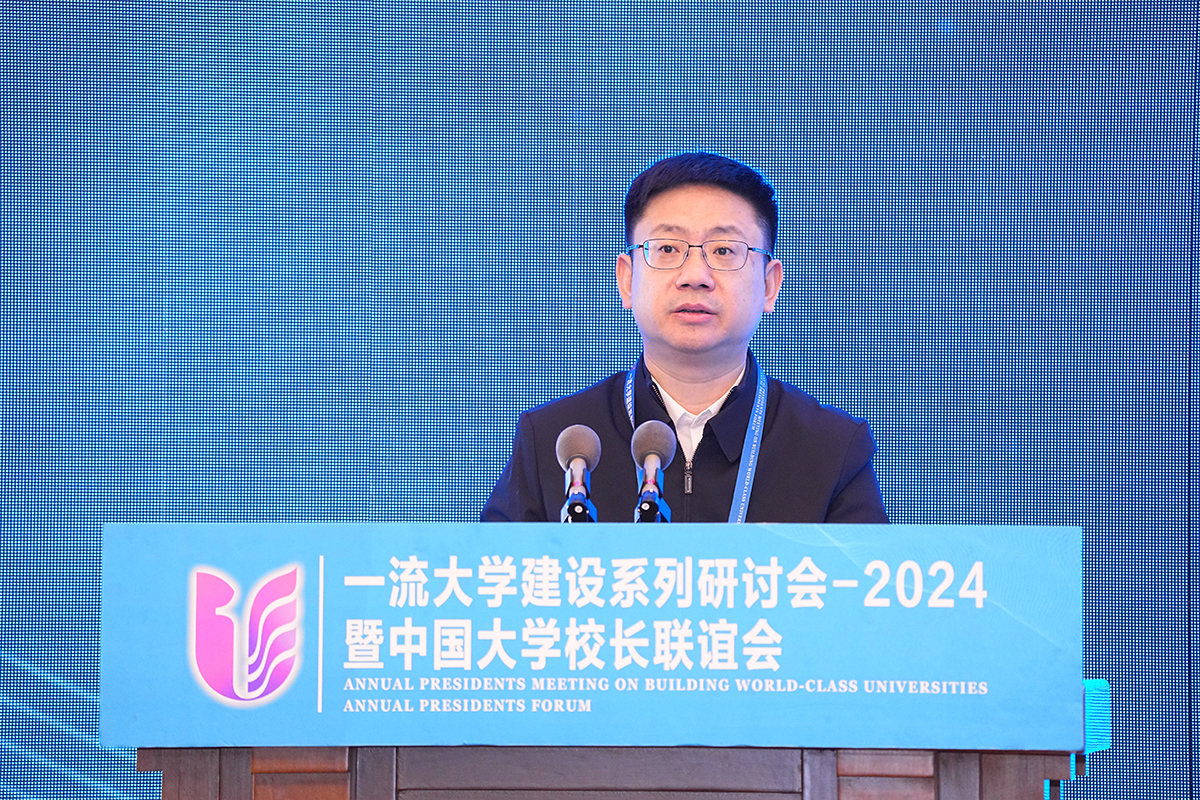 Luan Zongtao is delivering the speech.
Luan Zongtao is delivering the speech.
Han Jiecai pointed out in the welcome address that since the 18th CPC National Congress, the CPC Central Committee, with Comrade Xi Jinping at its core, has consistently prioritized education as a fundamental task for the country and the Party, setting the goal to build a strong education nation by 2035. As the first echelon of Chinese universities, we must firmly uphold the political, people-centered and strategic attributes of education, better understand the “timing” and “momentum,” accurately assess the “difficulties” and “opportunities,” take the lead and charge ahead, guide and support the construction of a strong education nation with solid achievements in becoming a world-class university ahead of schedule and rising to the forefront of global rankings. Harbin Institute of Technology will work hand in hand with its peer universities, jointly addressing the same topics and challenges, to accelerate the exploration and construction of models for nurturing top-notch innovative talent, earnestly undertake the task of “cultivating talent for the Party and the nation”, and deeply engage in multi-level and all-encompassing strategic interoperability, development and mutual assistance, and win-win cooperation with a global perspective. We will continually deliver excellent results to the Party and the people.
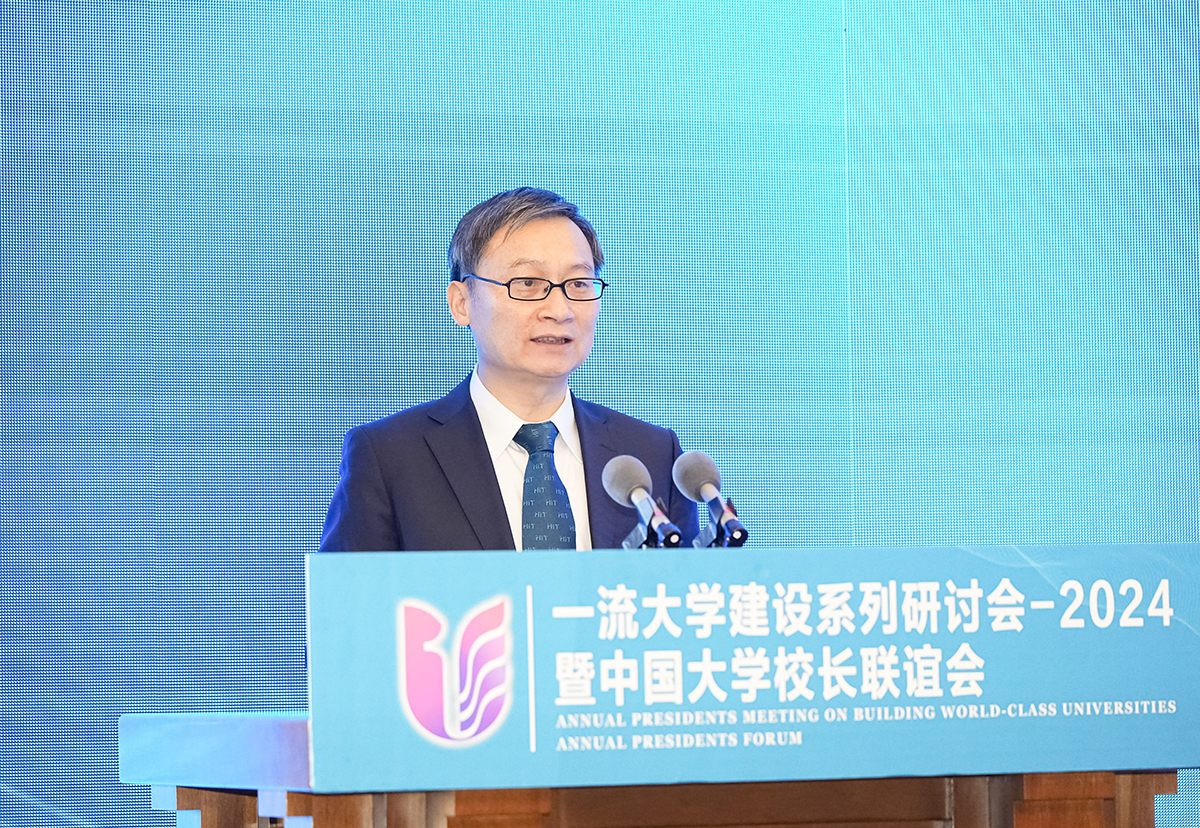 Han Jiecai is delivering the welcome address.
Han Jiecai is delivering the welcome address.
Li Luming, President of Tsinghua University and Gong Qihuang, President of Peking University respectively chaired the university presidents’ report sessions.
Chang Jin, President of University of Science and Technology of China (USTC), stated in his report titled “Maintaining Characteristics, Upholding Integrity and Innovation, and High-Quality Construction of a World-Class University with Chinese Characteristics,” that USTC will focus on foundational and strategic work, strengthen basic research, encourage interdisciplinary integration, and independently cultivate talent with international perspectives and innovative capabilities, contributing wisdom and strength to the construction of a strong nation in education, science and technology, and talent.
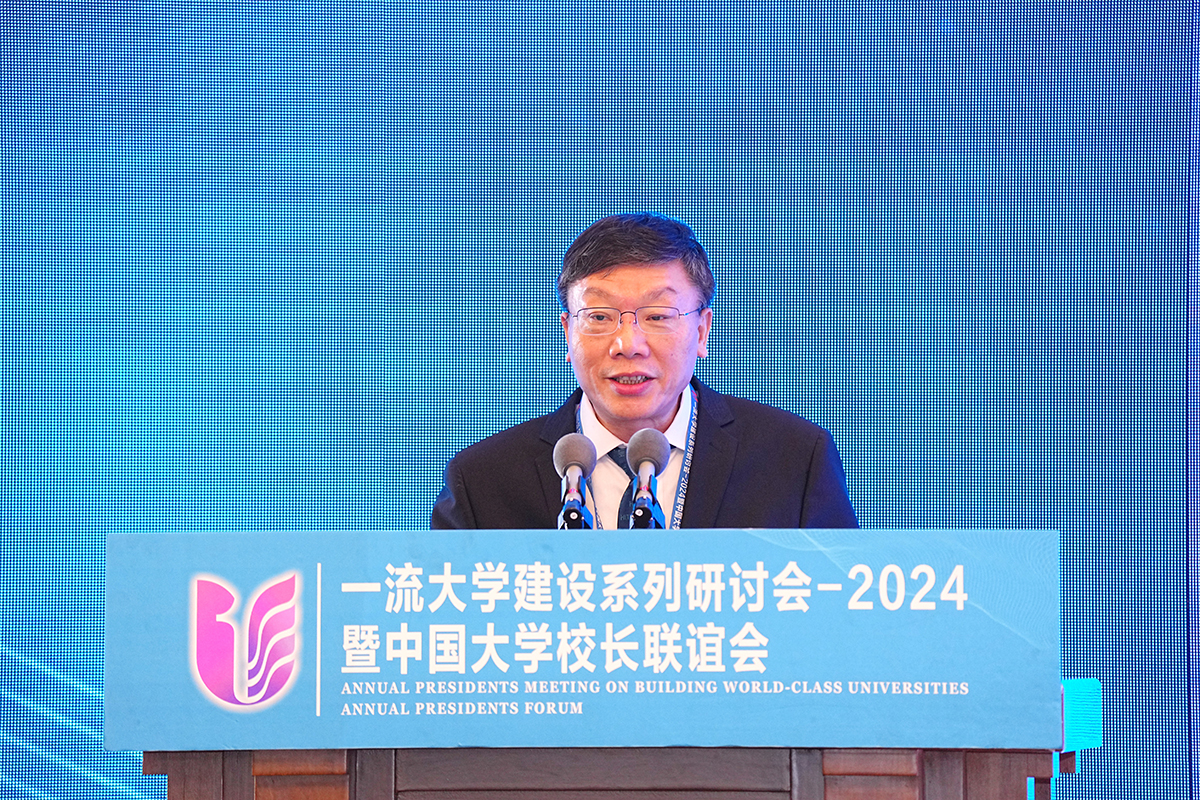 Chang Jin is presenting his report.
Chang Jin is presenting his report.
Gong Qihuang, President of Peking University, delivered a report titled “Focusing on Chinese Path to Modernization and Acting as a Hub for Integrated Development of Education, Technology and Talent.” He shared thoughts and practices on how high-level research universities can leverage their unique advantages, focus on key areas, and form a virtuous cycle of close integration and mutual promotion between education, science and technology, and talent.
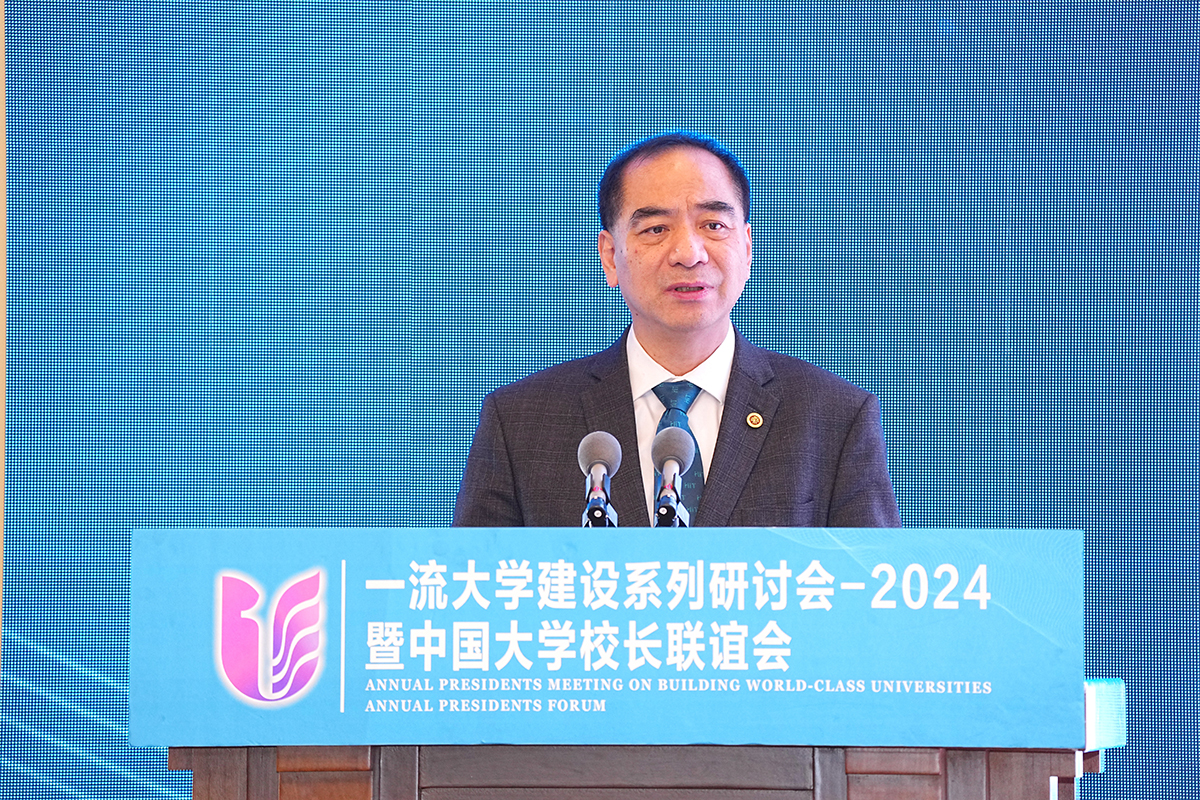 Gong Qihuang is presenting his report.
Gong Qihuang is presenting his report.
Ma Yugang, Vice President of Fudan University, gave a report titled “Implementing the ‘135 ’Path to Promote Integrated Reform of Education, Science and Technology, and Talent.” He introduced Fudan University’s implementation of the CPC Central Committee’s decisions and deployment. According to the 135 Path, which aims to “break through in one year, form a model in three years, and consolidate momentum in five years,” the overall approach focuses on advancing the integrated three-in-one reform and the construction of “Double First-Class” universities step by step.
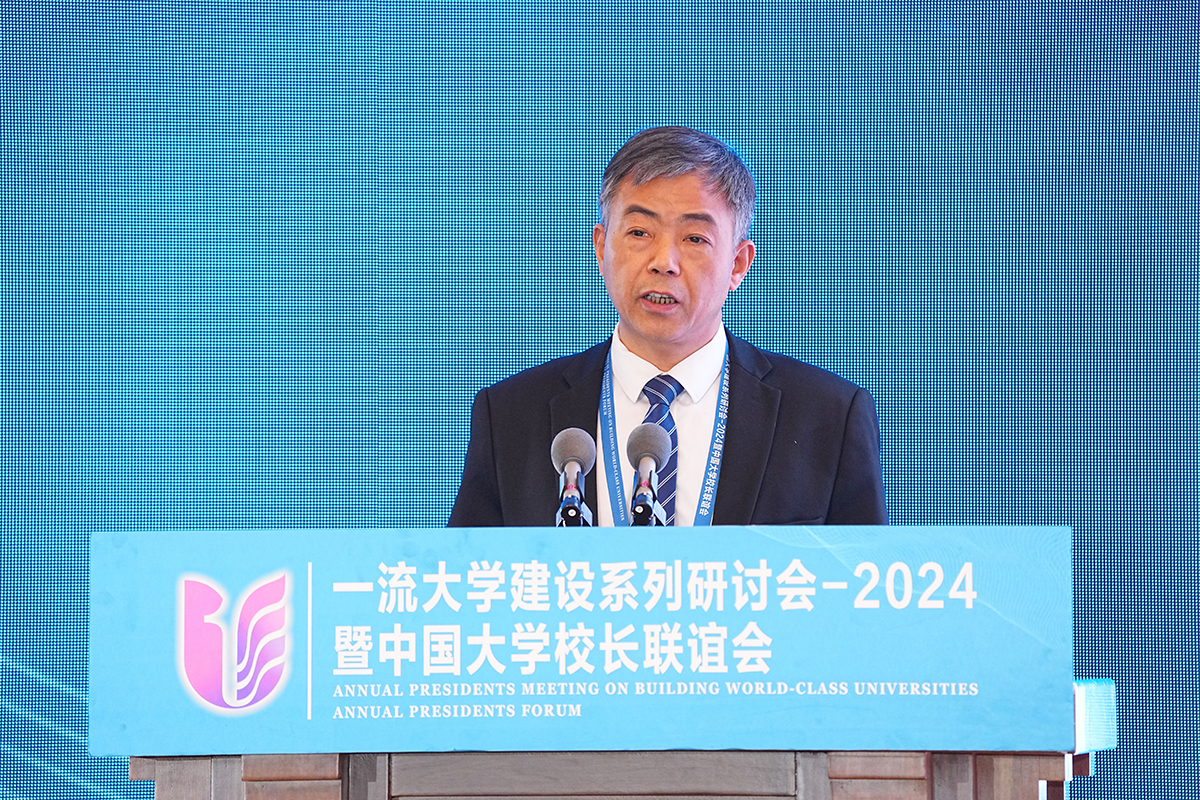 Ma Yugang is presenting his report.
Ma Yugang is presenting his report.
Ding Kuiling, President of Shanghai Jiao Tong University, delivered a report titled “Strengthen the ‘Two Independents’ and Bravely Shoulder the Mission of Building a Strong Education Nation through the World-Class Universities.” He shared the university’s unique approach from two aspects. One is “strengthening the independent cultivation of top-notch innovative talents and contributing to the construction of a high-level talent hub”. The other is “strengthening independent innovation in scientific research and its transformation and providing services to support high-level scientific and technological self-reliance and self-improvement.”
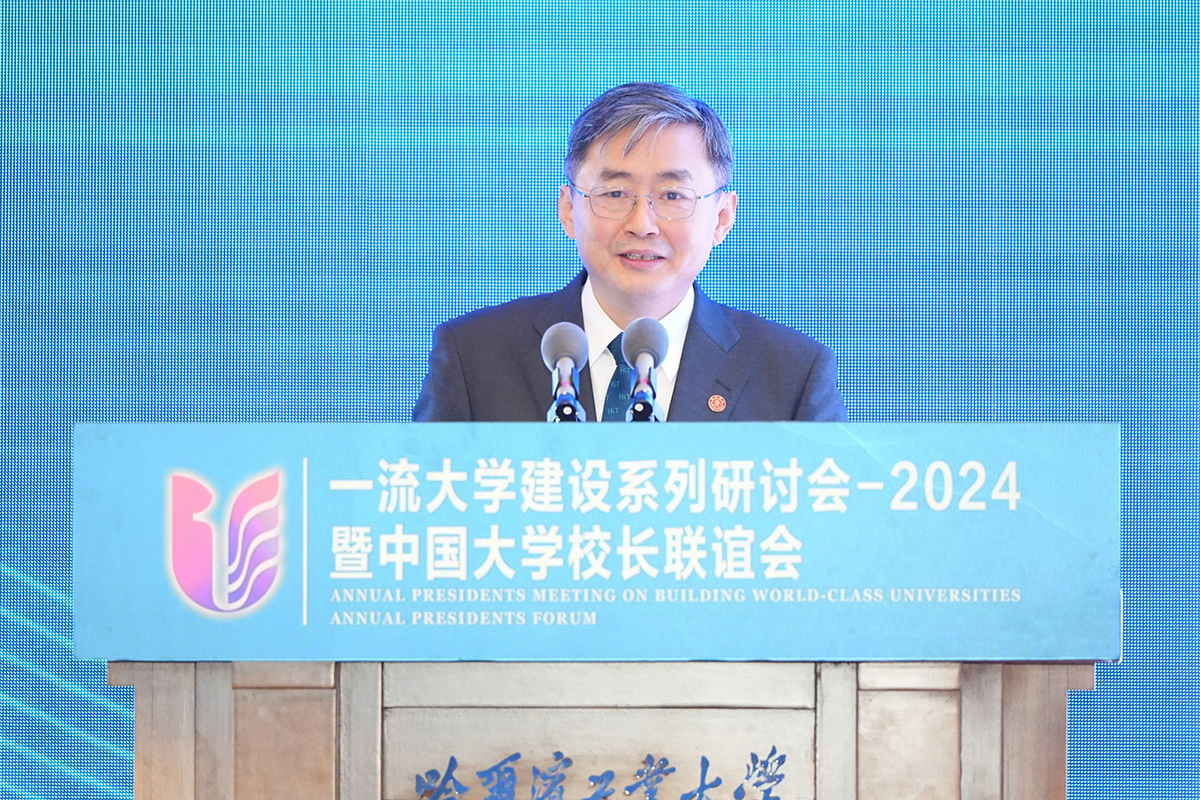 Ding Kuiling is presenting his report.
Ding Kuiling is presenting his report.
Tan Zhemin, President of Nanjing University, presented a report titled “Practicing the Mission of a World-Class University in Deepening Reform and Opening Up.” He shared Nanjing University’s efforts in responding to national needs, leveraging the university’s unique strengths, and its practical explorations and achievements in recent years in reforming institutional mechanisms and expanding opening-up internally and externally.
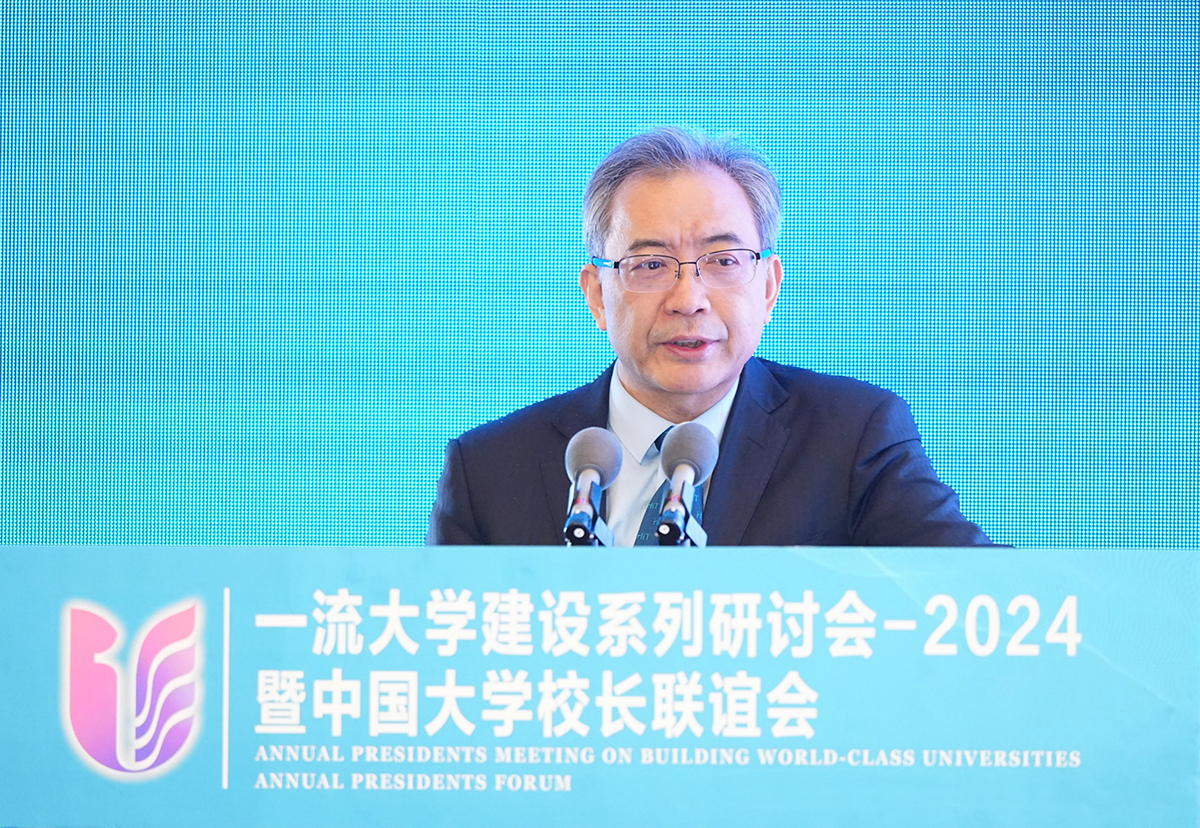 Tan Zhemin is presenting his report.
Tan Zhemin is presenting his report.
Du Jiangfeng, President of Zhejiang University, gave a report titled “Serving the Construction of High-Level Regional Innovation Clusters and Empowering the Development of New Quality Productive Forces with the Aggregation of Innovation Elements.” He emphasized that, as a leading force in basic scientific research and a driving force for major technological breakthroughs in China, the world-class universities gather innovative elements in high-end educational, science and technology, and talent resources, supporting the development of new quality productive forces through high-quality innovative talents and high-level innovative achievements.
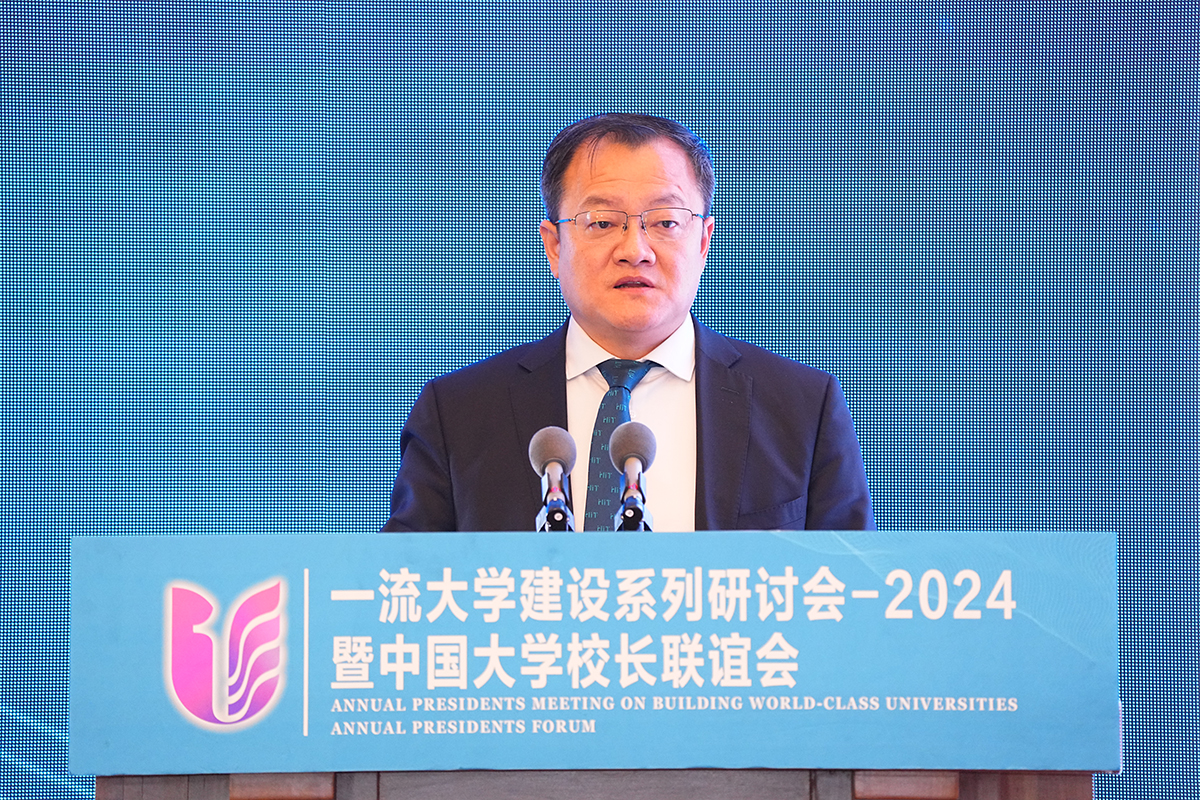 Du Jiangfeng is presenting his report.
Du Jiangfeng is presenting his report.
Li Luming, President of Tsinghua University, delivered a report titled “Deeply Understanding and Grasping the Connotation of ‘Six Forces’ to Better Serve the Construction of a Strong Education Nation.” He introduced the practices and approaches of Tsinghua University by serving the construction of a strong education nation as its mission and task, and focused on building stronger ideological and political leading forces, talent competitiveness, scientific and technological support forces, livelihood guarantee forces, social coordination forces and international influences.
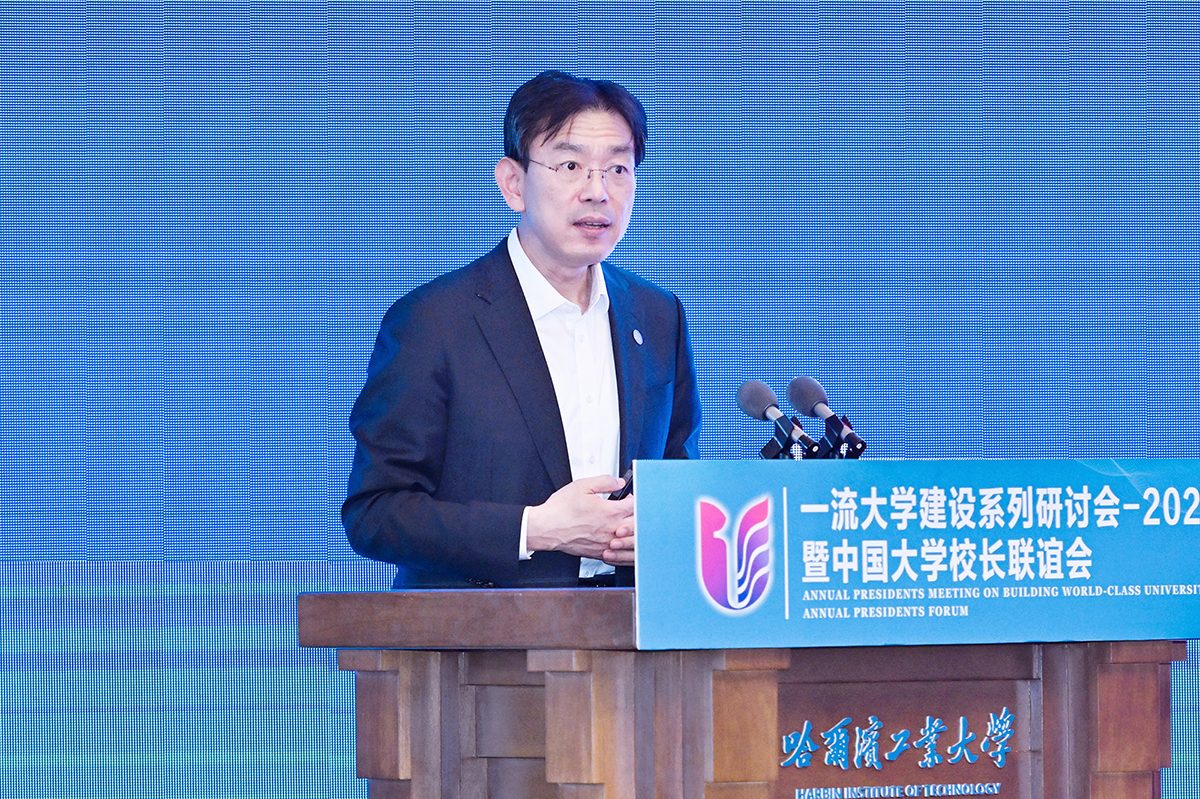 Li Luming is presenting his report.
Li Luming is presenting his report.
Zhang Liqun, President of Xi’an Jiaotong University, gave a report titled “Cultivating and Developing New Quality Productive Forces: World-Class Universities Defining Their Role and Demonstrating Their Value Contribution.” He emphasized that world-class universities are a crucial guarantee for cultivating urgently needed talent and building a leading country in education, a vital force for promoting technological innovation and building a strong country in science and technology, as well as an essential support for gathering innovative talent and building a leading country in talent.
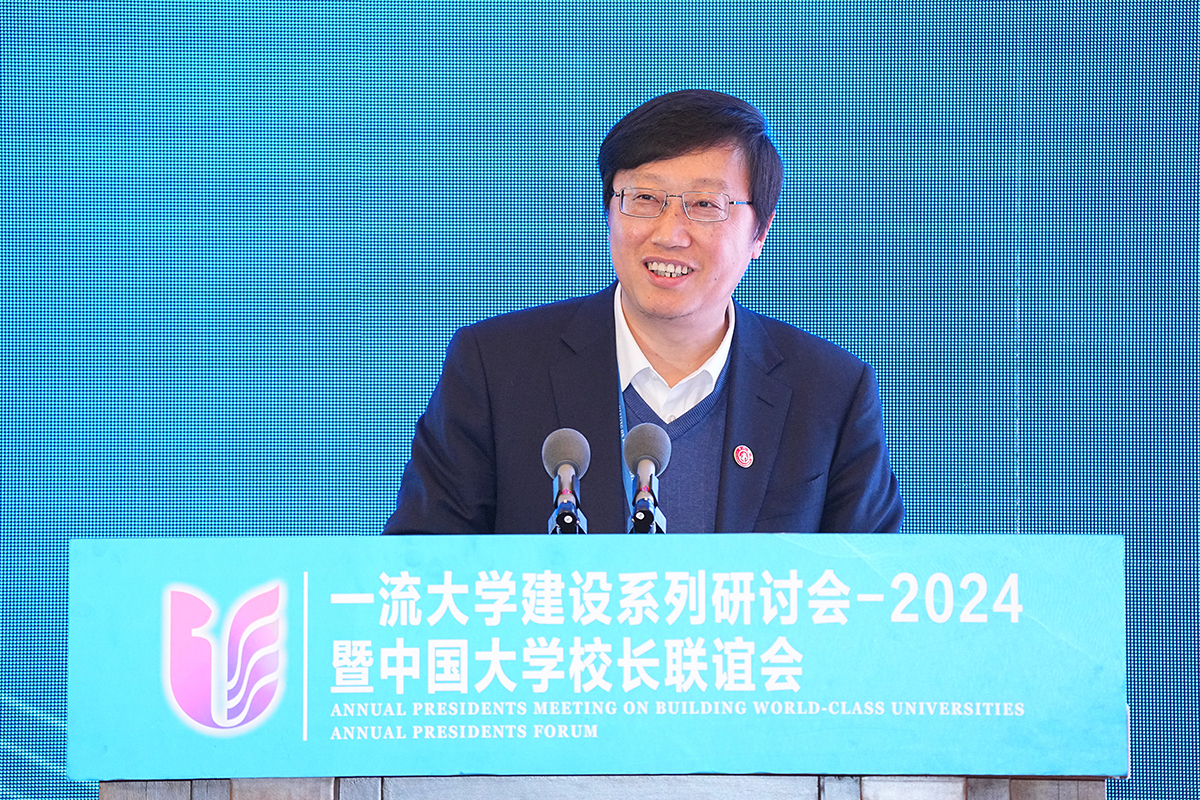 Zhang Liqun is presenting his report.
Zhang Liqun is presenting his report.
Zhang Xiang, President of the University of Hong Kong (HKU), delivered a report titled “The Challenges of Higher Education in the Era of AI.” He emphasized the need to keep pace with the changing times and actively address the impact of artificial intelligence on education and employment. He shared HKU’s vibrant practices in encouraging original innovation, introducing innovative models that align with technological advancements, and committing to contributing to the prosperity of Hong Kong and the development of the nation.
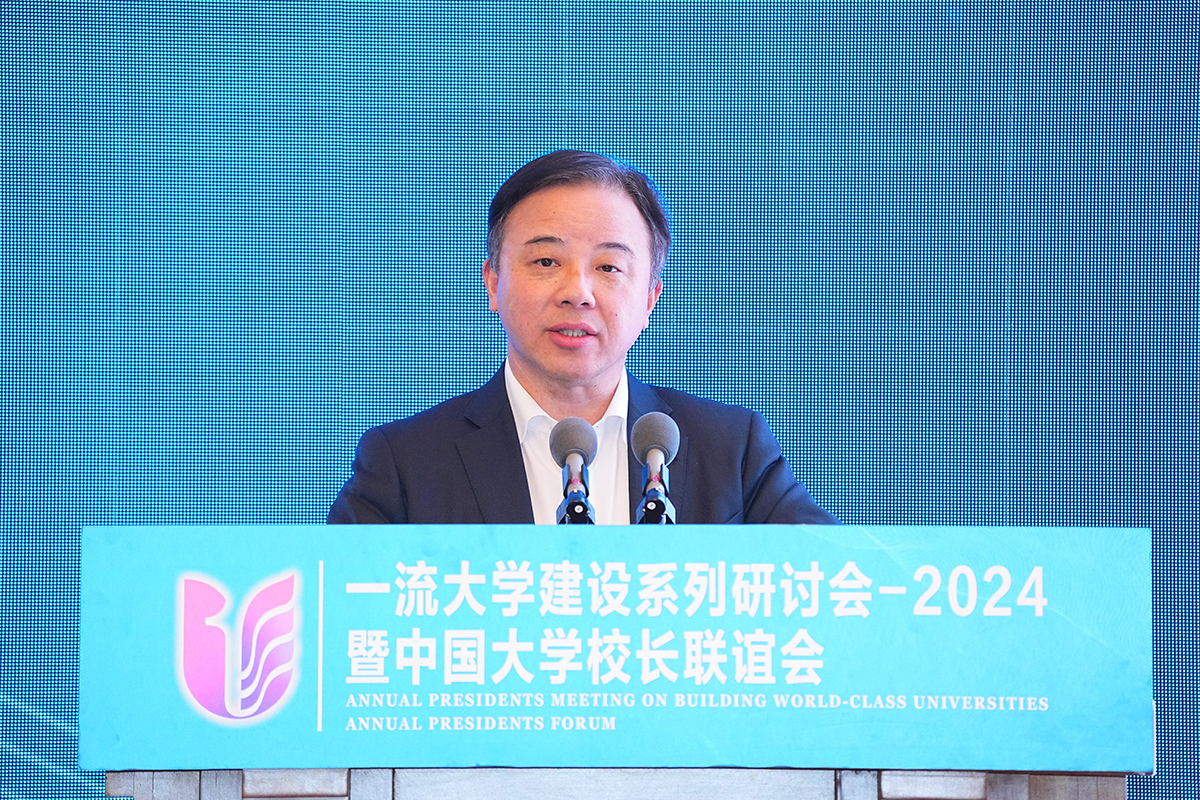 Zhang Xiang is presenting his report.
Zhang Xiang is presenting his report.
Poon Wai-yin, Acting Provost of the Chinese University of Hong Kong (CUHK), delivered a report titled “The Mission and Responsibility of World-Class Universities in the Construction of a Strong Education Nation.” She shared CUHK’s proactive alignment with national development strategies, leverage of its own advantages and strengths, and the initiatives and achievements in focusing on consolidating an internationally competitive education platform and cultivating high-quality talent.
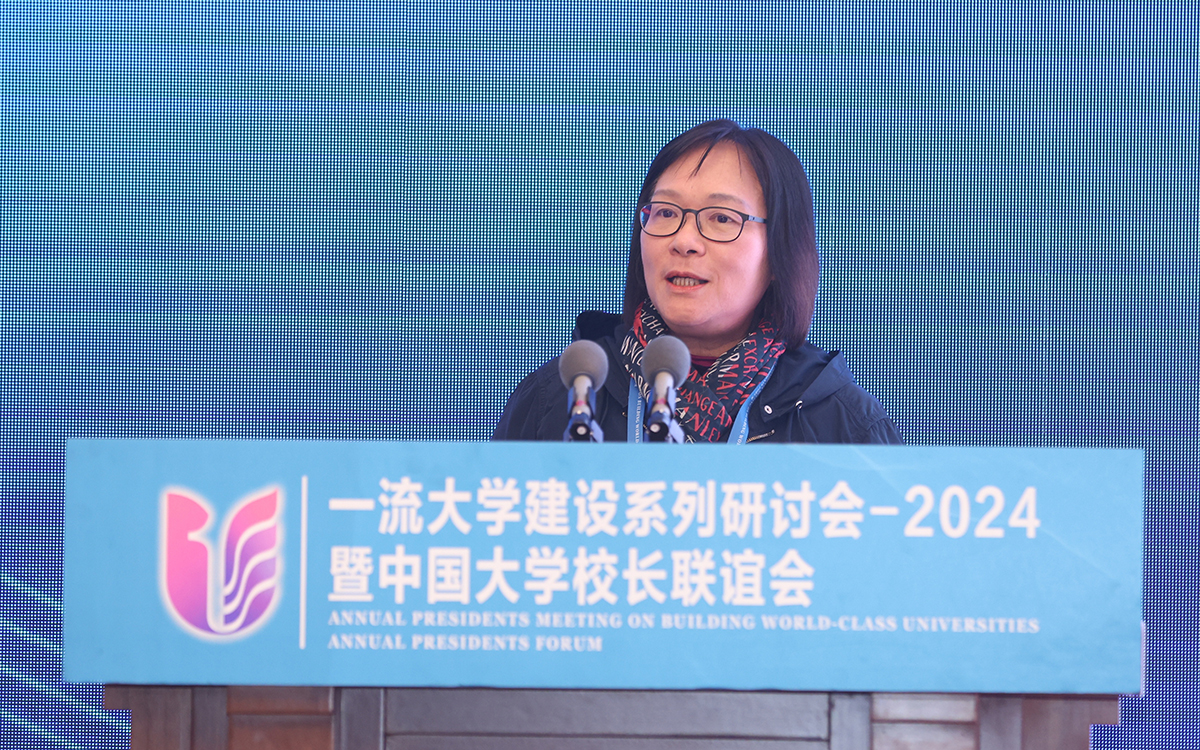 Poon Wai-yin is presenting her report.
Poon Wai-yin is presenting her report.
Wang Yang, Vice President of the Hong Kong University of Science and Technology (HKUST), gave a report titled “Prospects for the Future Development of Education, Technology and Talent.” He stated that in promoting the integrated development of education, technology and talent, HKUST will closely align with national needs and Hong Kong’s policies. With the goal of building a world-class research university, HKUST aims to actively cultivate high-quality talents capable of adapting to the future societal development and strives to become an important platform for driving technological innovation.
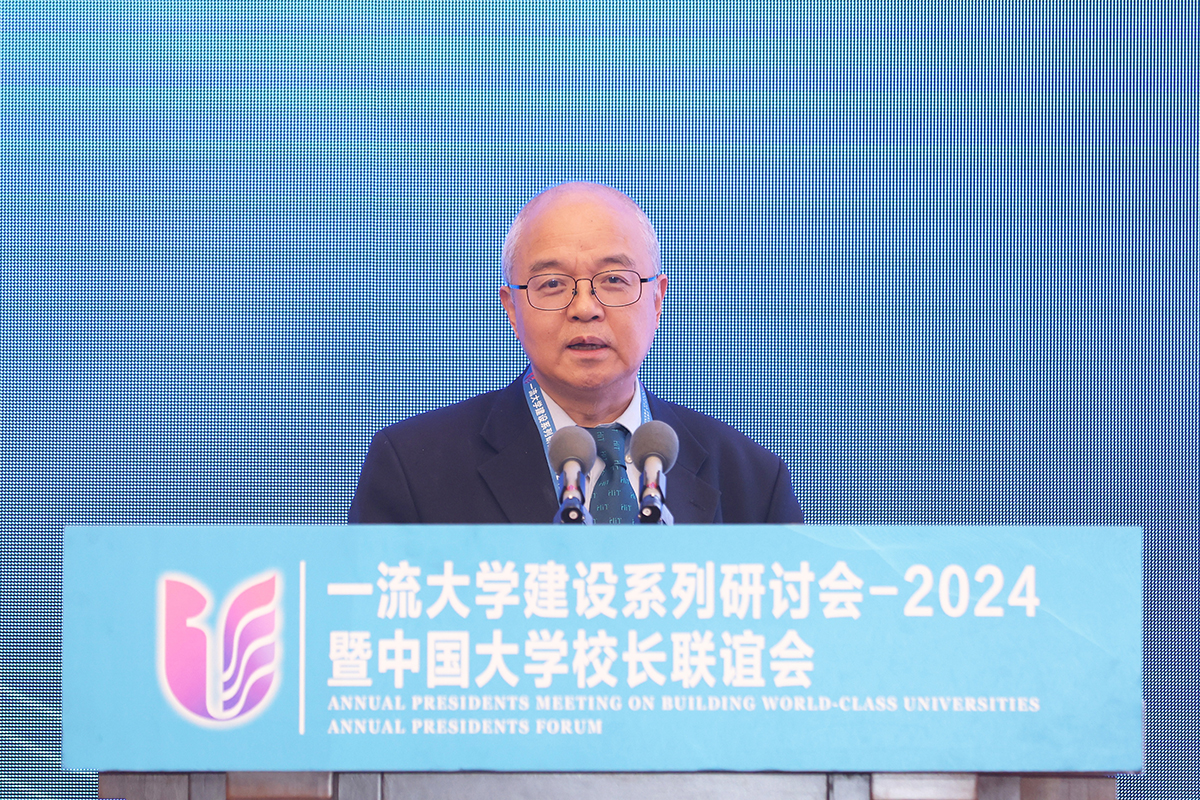 Wang Yang is presenting his report.
Wang Yang is presenting his report.
Song Yonghua, President of the University of Macau, delivered a report titled “Innovation and Expansion of the University of Macau Under the Requirements of the New Era.” He stated that the university will focus on cultivating and gathering more outstanding talents with international perspectives and competitiveness, and carry out high-level scientific research innovation and industry-university-research cooperation, aiming to make greater contributions to serving the country’s high-quality development and the construction of the Guangdong-Hong Kong-Macao Greater Bay Area.
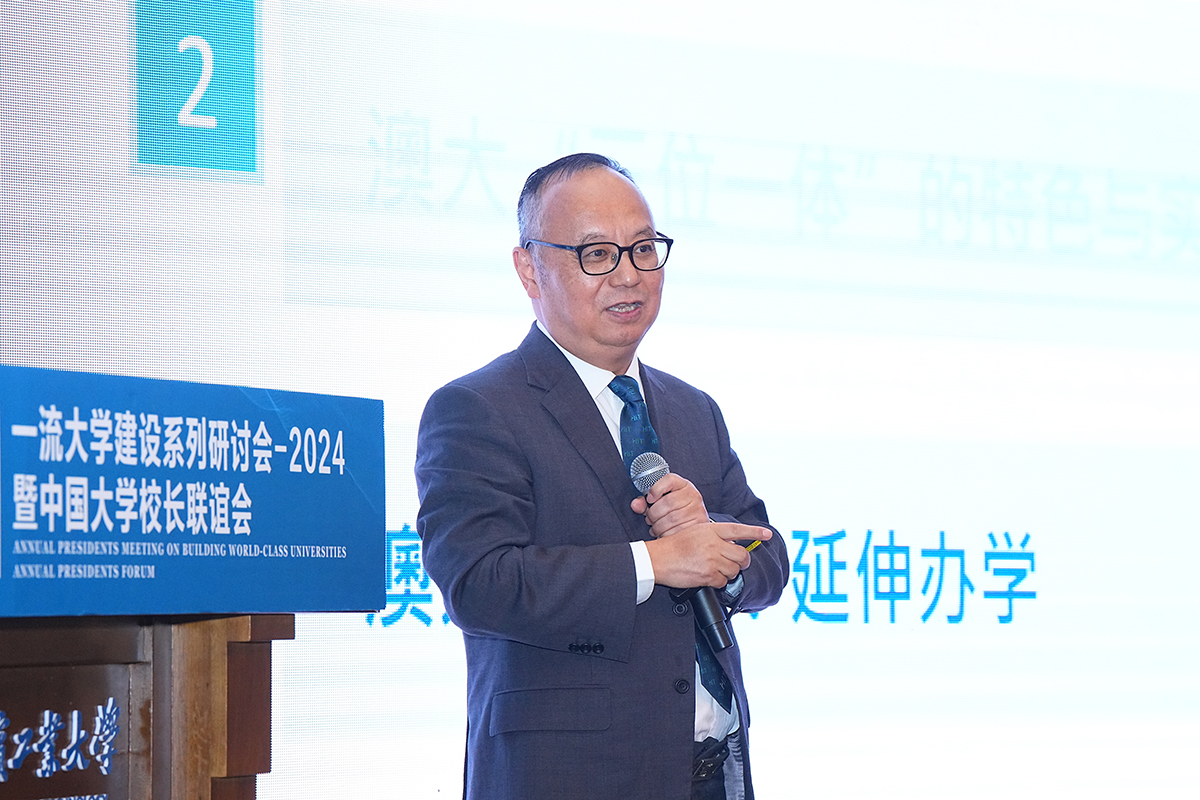 Song Yonghua is presenting his report.
Song Yonghua is presenting his report.
Han Jiecai delivered a report titled “Thoughts and Practices on Cultivating New Quality Productive Forces Rooted in Northeast China.” Closely aligning with the 2035 goal of building a strong education nation, his report discussed the historical development of world-class universities, elaborated on the contemporary meaning of new quality productive forces, and highlighted the opportunities and missions that the development of new quality productive forces presents for the accelerated rise of world-class universities with Chinese characteristics. He also introduced Harbin Institute of Technology’s active exploration of innovative thinking and extraordinary measures in serving the development of new quality productive forces in recent years.
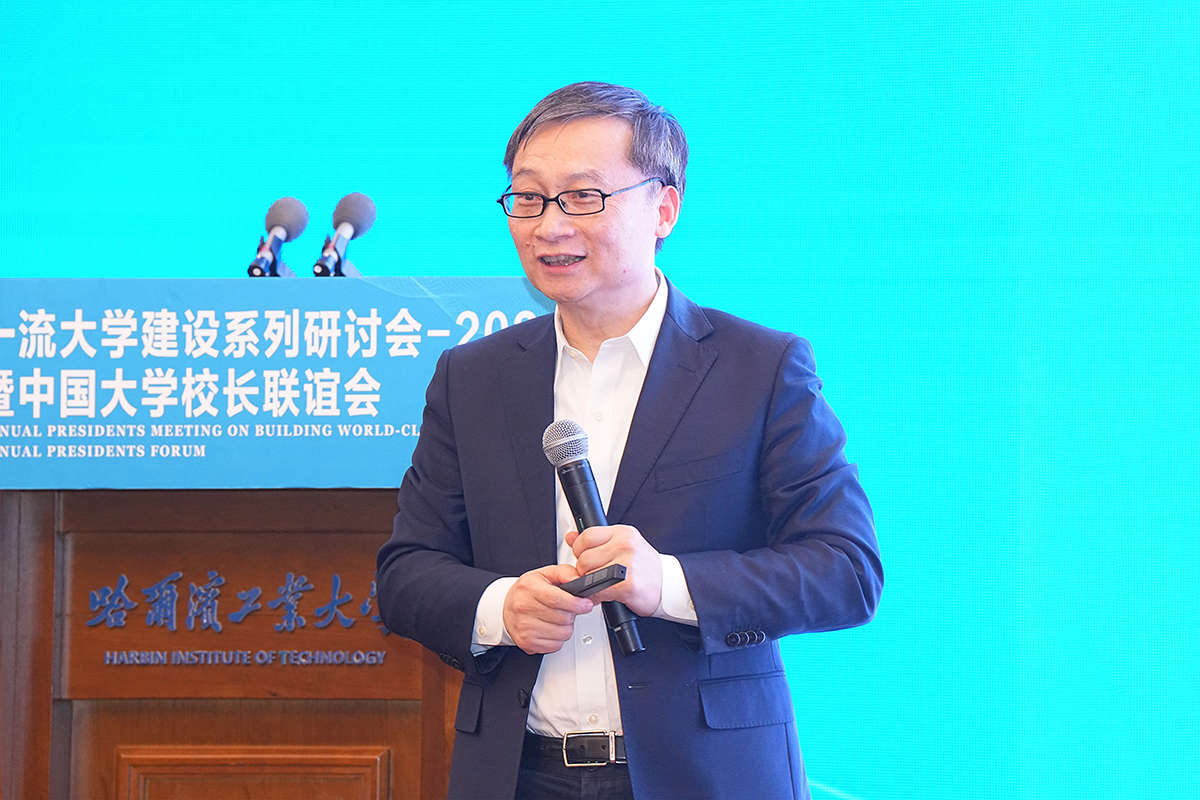 Han Jiecai is presenting his report.
Han Jiecai is presenting his report.
The “Harbin Declaration of the Association of University Presidents of China,”issued at the meeting, stated that universities must shoulder responsibilities bravely to serve the construction of a strong education nation, firmly keep the mission in mind to cultivate top-notch innovative talents, remain unwavering in determination to support the realization of high-level self-reliance and strength in science and technology, and universities should embrace the world and work together to build a new pattern of opening up in education. We will use the power of education to deeply plant the foundation for people's happiness and strengthen the foundation for the prosperity of the country with a strong education. We will strive to continuously present loyal answers in the construction of world-class universities with Chinese characteristics and as the first echelon on the new journey of building a strong education nation.
The meeting was attended by Fu Jianqi, Director of the Department of Personnel and Education of the Ministry of Industry and Information Technology, Cheng Shuang, Deputy Director of the Education Department of Heilongjiang Province, Zhang Zhe, Deputy Director of the Department of Science and Technology of Heilongjiang Province, Wang Xuefeng, Deputy Director of the Department of Industry and Information Technology of Heilongjiang Province, Piao Shilong, Vice President of Peking University, and university leaders of Harbin Institute of Technology. Responsible persons from the Ministry of Education, the Ministry of Industry and Information Technology, and relevant departments from 13 universities also participated in the forum.
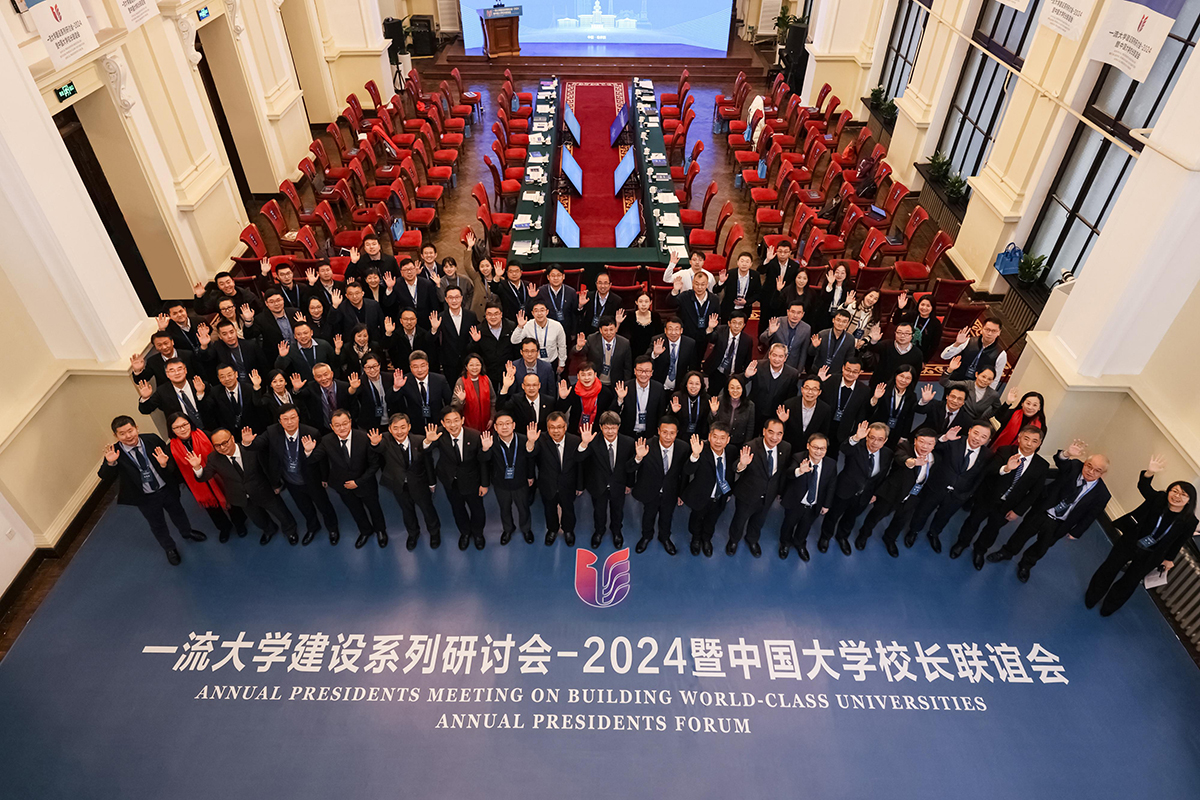 Annual Presidents Meeting on Building World-Class Universities
Annual Presidents Meeting on Building World-Class Universities
The Annual Presidents Meeting on Building World-Class Universities was jointly established by nine universities, including Peking University, Tsinghua University, Harbin Institute of Technology, Fudan University, Shanghai Jiao Tong University, Nanjing University, Zhejiang University, University of Science and Technology of China and Xi’an Jiaotong University, in accordance with the Ministry of Education’s guidelines and requirements for “building world-class universities.” It aims to promote the construction of world-class universities in China through exploring challenges and exchanging experiences, facilitate inter-university cooperation and create Chinese education brands. The first meeting was held at Tsinghua University in March 2003, and has become an annual event since then, hosted on a rotational basis by participating universities. In 2010, the University of Hong Kong, the Chinese University of Hong Kong and the Hong Kong University of Science and Technology were invited to join. In 2023, the University of Macau was invited to participate.


